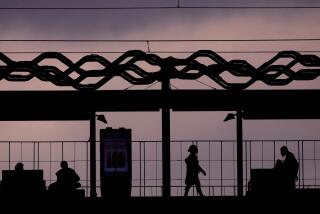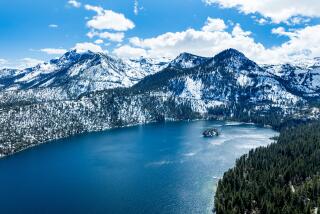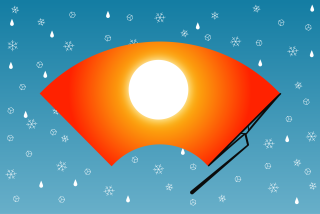‘It’s kind of a weather roller coaster’: On last day of summer, California hit by snow, hail
Snow fell in Sierra Nevada on the last day of summer, giving the towering mountain range shared by California and Nevada a wintry look in September and making travel hazardous.
Mammoth Lakes got more than a dusting Thursday in the first snowfall of the season, with 3 inches reported in the village. Snow coated the roads so heavily that the plows were out, and locals left footprints on sidewalks.
Sixteen vehicles crashed on Interstate 80 as snow and hail fell Thursday, killing a man driving a pickup and causing minor injuries to other people, California Highway Patrol Officer Chris Nave said.
Snow dusted peaks in Yosemite National Park and temporarily closed Tioga Pass road, the soaring eastern entry to the park that typically doesn’t become impassable until mid-November.
Several inches of snow were expected at elevations of at least 6,000 feet in the northern Sierra, National Weather Service forecaster Hannah Chandler said in Sacramento.
“The last days of summer,” the Placer County Sheriff’s Office wryly tweeted in a post showing snow falling on patrol vehicles at its Lake Tahoe station.
Sugar Bowl, a ski resort perched atop Donner Summit, received a good dusting that’s getting skiers excited about the upcoming season, resort spokesman Jon Slaughter said.
“We’ve got people calling about season passes and checking our webcams to take a look at the first snow,” Slaughter said.
Slaughter, however, didn’t anticipate the storm having much of an effect on how early the resort can open because the snow likely will melt.
But the first snow of the season came just four months after Sugar Bowl’s last ski season ended with nearly 800 inches of snowfall, part of a very wet winter that gave California at least a temporary respite from years of drought that left the Sierra with scant snowcaps.
At Oroville Dam, where crews are rushing to repair two badly damaged spillways before California’s winter rainy season starts in earnest, dam operators were keeping an eye on forecasts.
“We’re definitely tracking the weather, but it has had no impact and we don’t expect it to,” said Erin Mellon, a spokeswoman for the state Department of Water Resources.
The taste of winter is not expected to last long.
“Fall is a big transition period, so we have these big dips in temperature and then we go higher,” said Chandler, the forecaster. “It’s kind of a weather roller coaster.”
Southern California also took an early leap into fall, with cloudy skies and rain showers across the region in advance of the autumnal equinox at 1:02 p.m. Friday.
But temperatures should remain in the 70s until Sunday, when the entire region will begin to warm up.
Starting Sunday, temperatures will begin to climb and should reach the 80s along the coast and 90s in the inland valleys, she said.
The fire risks shouldn’t be particularly great across the Southland as average humidity and low winds also are in the forecast.
Times staff writers Chris Erskine and Joseph Serna contributed to this report.
ALSO
Light rain keeps Southern California cool but forecasters predict a return to the 90s next week
Readers share their best summer vacation photos. Of 1,000 entries, here are our faves
Hear about the tract house that went for $800,000 above asking? Welcome to California 2017
UPDATES:
Sept. 22, 9 a.m.: This article was updated with information from Mammoth Lakes and details about warming temperatures in Southern California.
This article was originally published at 5 p.m. Sept. 21.
More to Read
Sign up for Essential California
The most important California stories and recommendations in your inbox every morning.
You may occasionally receive promotional content from the Los Angeles Times.










